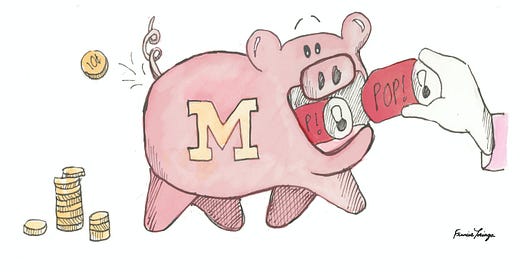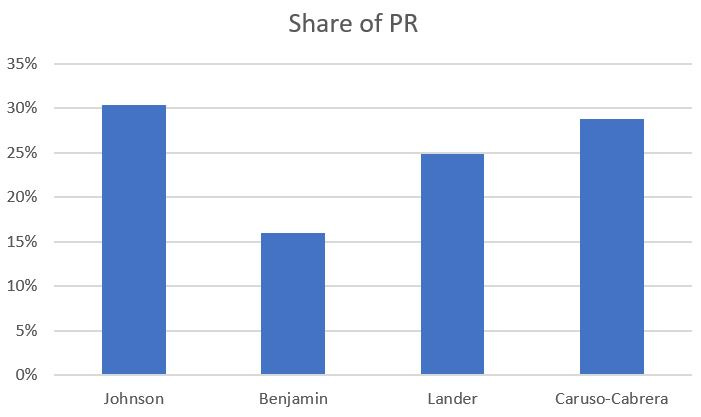Eons ago, when I was statistically less significant, not quite 95% confident, and surprisingly more normal, my first professional data gig was for the Office of the NYS Comptroller up in Albany. As an intern, I got my first taste of Excel, and I never looked back (except when I am using R).
Although the NYS comptroller is one of three NYS elected officials, it did not feel like I was working in politics. My summer was mostly spent compiling spreadsheets, reviewing retirement files, and looking at pension numbers. This was not exactly Sorkin’s West Wing.
On the primary ballot this June, we will be electing a new city comptroller. A recent poll found that 49% of voters were undecided with a first ranked choice, and 61% were undecided with a second ranked chance. This election has not been given much thought from the public.
Although there is no ComptrollerModel, today’s 2xParked is dedicated to the third item on our NYC ballot.
Comptroller or Controller?
The qualifications of the comptroller are more similar in nature to the attorney general than to the public advocate. Whereas the public advocate has minimal responsibility (and prerequisites and budget and staff and opportunity and accountability), an effective attorney is generally a prereq for being an effective AG. Similarly, a successful comptroller is not someone with only good character. A comptroller needs to know about money.
If you have time, you can read this 150+ page job description. Or we can do the next best thing: data analysis.
Using text analysis, I compared this job description with the job descriptions of professions we are actually familiar with. I used dozens of job descriptions from Indeed.com of lawyers, financial analysts, accountants, and journalists. I also included several articles describing city councilperson responsibilities as another comparison.
Below is the distance in the descriptions between these professions and the NYC comptroller. What is important is not the actual number but the relative size of the number when comparing one profession to another. The smaller the distance, the closer it is to being similar to the comptroller.
The comptroller is most similar to an accountant. This comes as no surprise.
What also is not a surprise is how unsuccessful former comptrollers are at running for mayor. Both Bill Thompson and John Liu lost their mayoral campaigns. Unlike lawyers who can do victory laps after court wins or representatives who can champion their legislation, there is very little public glory in a good audit. (Although with the tax deadline upon us, I wonder if 2021 will be the year of the accountant).
The comptroller is a serious position and should not be an afterthought. Because expertise is needed, it is not just a stepping stone for mayor, like the public advocate. There are real responsibilities, like serving as a fiduciary to the city’s $250+ billion pension funds. A bad comptroller is capable of as much long term destruction to the city as a bad mayor.
The Field
As Scott Stringer tries to break the curse of former NYC comptrollers, his potential successors are in their own election battle. According to the last poll, there are four major candidates.
Although none of the candidates are former accountants, Brian Benjamin, an MBA from Harvard and a former financial advisor, is the closest. Meanwhile, Corey Johnson and Brad Lander are both City Councilmen, and Michelle Caruso-Cabrera is a business reporter. If we look at that chart above, this should give Benjamin a clear edge in terms of experience.
That is not the case. If we look at Google searches over the past 3 months, we see Benjamin lags behind the other three candidates, although no one really has taken a commanding lead. This is surprising, especially given Johnson’s prominent public position.
This is confirmed when we look at share of voice. Johnson is again leading, but he is not dominating.
I had a bit of fun looking at the campaigns of these four candidates. Using the language of their proposed plans and policies on their websites, I ran a sentiment analysis to see if there were any differences.
All the candidates use similarly positive language, and all of the candidates try to use language to build trust. This means the candidates are trying to make you comfortable with them as a person. The main difference is what I refer to as “optimistic language”. These are the percent of words which reflect optimistic emotions (e.g. joy, surprise, anticipation) compared to those which reflect pessimistic emotions (e.g. fear, anger, disgust). Brad Lander is running more of a doom-to-gloom campaign compared to the other candidates, while Michele Caruso-Cabrera is preaching on hope for the city’s financial future.
MayorModel
You have probably heard the joke about the bear and the campground. There are two campers chilling when a bear comes to their tent. Upon seeing the bear, one camper takes off his hiking boots to put on sneakers. The other camper goes “what are you doing? You can’t outrun a bear.” The camper, now with his Nikes on, responds, “I don’t need to outrun the bear. I only have to run faster than you”.
This is ranked choice voting. In RCV, you do not need to get the most first place votes. You just have to finish higher on more ballots than the other candidates, and have enough votes not to be eliminated.
On the one hand, this means candidates should not stop campaigning. Candidates should be trying do well with all electorates as opposed to winning them over, and that high percent of undecideds are the most valuable currency.
This also means it is difficult to make a comeback. Unless a candidate is fundamentally divisive, a small lead, even a lead with far below the 50% threshold to win, is extremely unlikely to overcome. Policy similarities or questionable character traits are the only two things really which will disproportionately move the needle, but they likely will only make a difference if the vote is close. 2nd+ ranked votes are not as thoroughly vetted among voters, making them a bit more random and giving the advantage to the leader.
“Michigan Piggy Bank" was drawn by Ink&thyme, drawing life's unforgettable moments. For unique art drawn just for you, check them out on Facebook and on Instagram.
To subscribe to future newsletters, click here.
For more content, follow 2xParked on Twitter @2xParked.
Comments? Suggestions? Questions? Email me at 2xParked@gmail.com.








